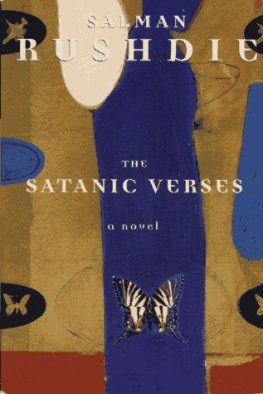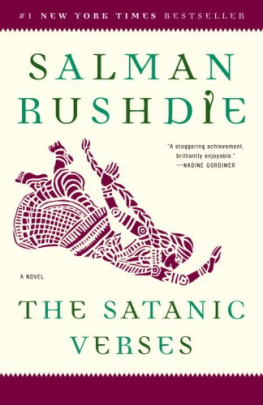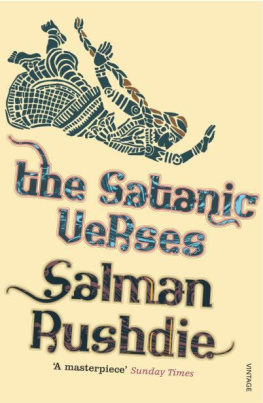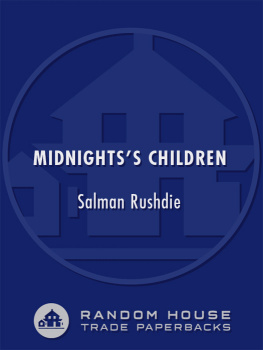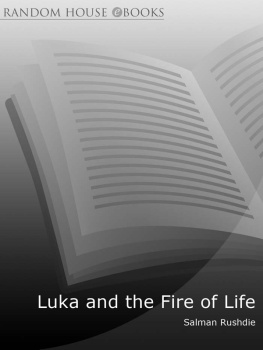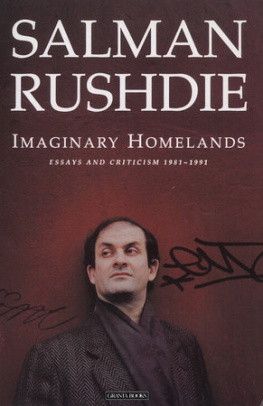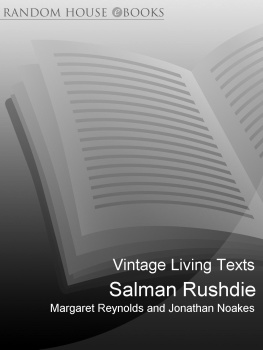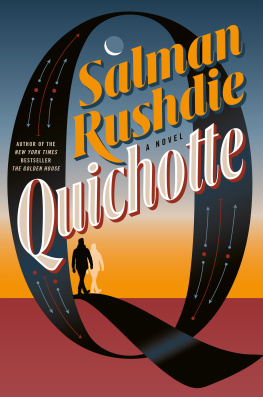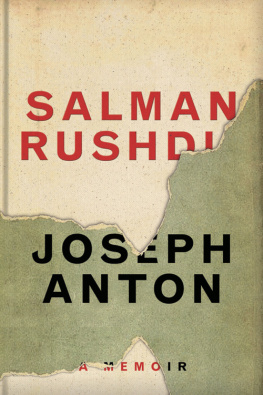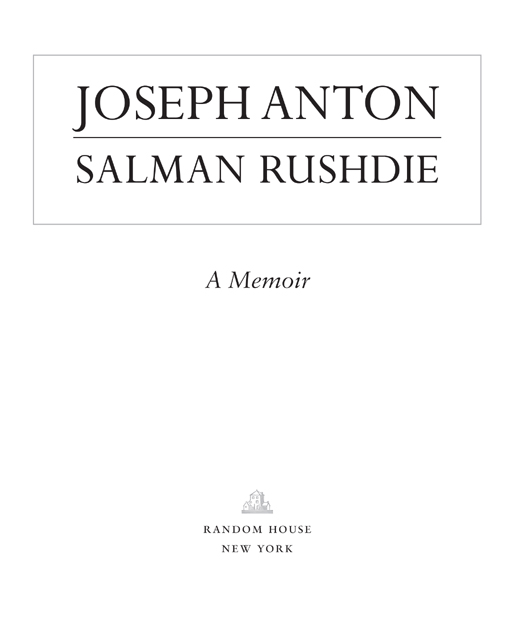ALSO BY SALMAN RUSHDIE
FICTION
Grimus
Midnights Children
Shame
The Satanic Verses
Haroun and the Sea of Stories
East, West
The Moors Last Sigh
The Ground Beneath Her Feet
Fury
Shalimar the Clown
The Enchantress of Florence
Luka and the Fire of Life
NONFICTION
The Jaguar Smile: A Nicaraguan Journey
Imaginary Homelands: Essays and Criticism 19811991
Step Across This Line: Collected Nonfiction 19922002
PLAYS
Haroun and the Sea of Stories (with Tim Supple and David Tushingham)
Midnights Children (with Tim Supple and Simon Reade)
SCREENPLAY
Midnights Children
ANTHOLOGIES
Mirrorwork: 50 Years of Indian Writing, 19471997 (coeditor)
Best American Short Stories 2008 (coeditor)
Copyright 2012 by Salman Rushdie
All rights reserved.
Published in the United States by Random House, an imprint of The Random House Publishing Group, a division of Random House, Inc., New York.
R ANDOM H OUSE and colophon are registered trademarks of Random House, Inc.
Grateful acknowledgment is made to the following for permission to reprint previously published material:
GROVE/ATLANTIC, INC., FABER AND FABER LIMITED, AND JUDY DAISH ASSOCIATES LIMITED: Len Hutton by Harold Pinter from Various Voices by Harold Pinter (Grove/Atlantic, Inc.) and Collected Poems and Prose (Faber and Faber Limited), copyright 1998 by Harold Pinter. Electronic book rights are administered by Judy Daish Associates Limited. Reprinted by permission of Grove/Atlantic, Inc., Faber and Faber Limited, and Judy Daish Associates Limited.
JOHN LE CARR: Letters from John le Carr printed in The Guardian.
Copyright 1997 by John le Carr. Reprinted by permission.
NEW DIRECTIONS PUBLISHING CORPORATION: The Ivy Crown by William Carlos Williams from The Collected Poems: Volume II, 19391962, copyright 1953 by William Carlos Williams. Reprinted by permission of New Directions Publishing Corporation.
eISBN: 978-0-679-64388-3
www.atrandom.com
Cover design: theBookDesigners
v3.1
To my children
Zafar and Milan
and their mothers
Clarissa and Elizabeth
and to everyone
who helped
And by that destiny to perform an act
Whereof whats past is prologue, what to come
In yours and my discharge.
W ILLIAM S HAKESPEARE ,
The Tempest
Contents

Prologue
The First Blackbird
I
A Faustian Contract in Reverse
II
Manuscripts Dont Burn
III
Year Zero
IV
The Trap of Wanting to Be Loved
V
Been Down So Long It Looks Like Up to Me
VI
Why Its Impossible to Photograph the Pampas
VII
A Truckload of Dung
VIII
Mr. Morning and Mr. Afternoon
IX
His Millenarian Illusion
X
At the Halcyon Hotel
Prologue

The First Blackbird
A FTERWARDS, WHEN THE WORLD WAS EXPLODING AROUND HIM AND THE lethal blackbirds were massing on the climbing frame in the school playground, he felt annoyed with himself for forgetting the name of the BBC reporter, a woman, who had told him that his old life was over and a new, darker existence was about to begin. She had called him at home on his private line without explaining how she got the number. How does it feel, she asked him, to know that you have just been sentenced to death by the Ayatollah Khomeini? It was a sunny Tuesday in London but the question shut out the light. This is what he said, without really knowing what he was saying: It doesnt feel good. This is what he thought: Im a dead man. He wondered how many days he had left to live and thought the answer was probably a single-digit number. He put down the telephone and ran down the stairs from his workroom at the top of the narrow Islington row house where he lived. The living room windows had wooden shutters and, absurdly, he closed and barred them. Then he locked the front door.
It was Valentines Day but he hadnt been getting on with his wife, the American novelist Marianne Wiggins. Six days earlier she had told him she was unhappy in the marriage, that she didnt feel good around him anymore, even though they had been married for little more than a year, and he, too, already knew it had been a mistake. Now she was staring at him as he moved nervously around the house, drawing curtains, checking window bolts, his body galvanized by the news as if an electric current were passing through it, and he had to explain to her what was happening. She reacted well, beginning to discuss what they should do next. She used the word we. That was courageous.
A car arrived at the house, sent by CBS television. He had an appointment at the American networks studios in Bowater House, Knightsbridge, to appear live, by satellite link, on its morning show. I should go, he said. Its live television. I cant just not show up. Later that morning the memorial service for his friend Bruce Chatwin was to be held at the Orthodox church on Moscow Road in Bayswater. Less than two years earlier he had celebrated his fortieth birthday at Homer End, Bruces house in Oxfordshire. Now Bruce was dead of AIDS, and death had arrived at his own door as well. What about the memorial, his wife asked. He didnt have an answer for her. He unlocked the front door, went outside, got into the car and was driven away, and although he did not know it then, so that the moment of leaving his home did not feel unusually freighted with meaning, he would not go back to that house, his home for five years, until three years later, by which time it was no longer his.
The children in the classroom in Bodega Bay, California, sing a sad nonsense song. She combed her hair but once a year, ristle-te, rostle-te, mo, mo, mo. Outside the school a cold wind is blowing. A single blackbird flies down from the sky and settles on the climbing frame in the playground. The childrens song is a roundelay. It begins but it doesnt end. It just goes round and round. With every stroke she shed a tear, ristle-te, rostle-te, hey-bombosity, knickety-knackety, retroquo-quality, willoby-wallaby, mo, mo, mo. There are four blackbirds on the climbing frame, and then a fifth arrives. Inside the school the children are singing. Now there are hundreds of blackbirds on the climbing frame and thousands more birds fill the sky, like a plague of Egypt. A song has begun, to which there is no end.
When the first blackbird comes down to roost on the climbing frame it seems individual, particular, specific. It is not necessary to deduce a general theory, a wider scheme of things, from its presence. Later, after the plague begins, its easy for people to see the first blackbird as a harbinger. But when it lands on the climbing frame its just one bird.
In the years to come he will dream about this scene, understanding that his story is a sort of prologue: the tale of the moment when the first blackbird lands. When it begins its just about him; its individual, particular, specific. Nobody feels inclined to draw any conclusions from it. It will be a dozen years and more before the story grows until it fills the sky, like the Archangel Gabriel standing upon the horizon, like a pair of planes flying into tall buildings, like the plague of murderous birds in Alfred Hitchcocks great film


